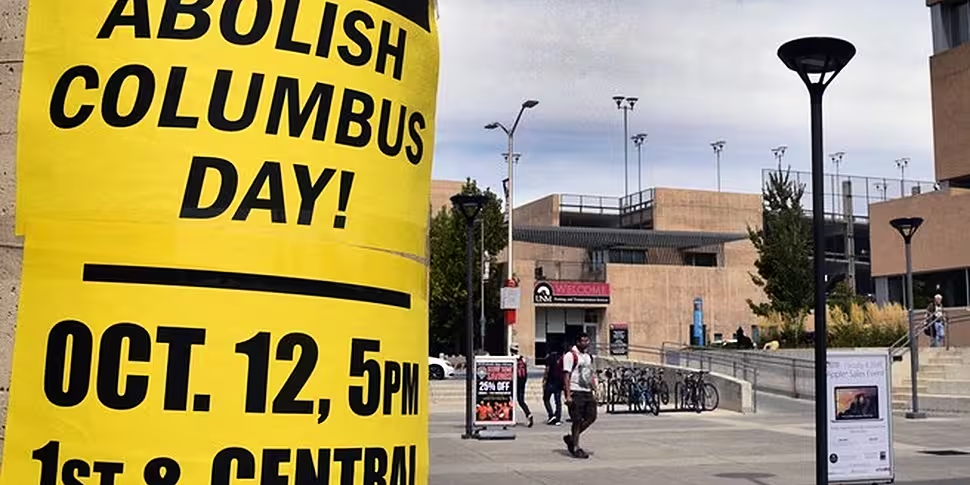Four score and one year ago, Franklin Delano Roosevelt declared that October 12th would be celebrated in the United States of America as Columbus Day. In the 1970s, President Richard Nixon issued a federal mandate making it a national holiday on the second Monday of October, recognised from coast to coast. The tradition has been upheld, year in, year out. Just not everywhere.
In 2015, things have changed. Nowadays, we live in a time when the aftermath of Columbus’ arrival in the new world is observed as the beginning of a Holocaust for the indigenous American peoples, who saw their populations decimated by colonial oppression, a stain on European history. That history cannot be changed, but the celebration and heralding of Columbus is beginning to, as a growing number of cities are looking to abolish the holiday, and to replace it with one that recognises the millions whose lives and cultures were destroyed when Columbus set foot on an island in the Bahamas on October 12th, 1492.
523 years later, the holiday that bears Columbus’ name is no more in nine US cities, including Albuquerque, Portland, Seattle, Minneapolis, and Berkeley. In these areas, the second Monday of the 10th month of the year is known as Indigenous Peoples Day. It’s also that way in the entire states of Alaska, Hawaii, Oregon, and South Dakota, with the federal holiday's namesake replaced with the celebration of native history.
Earning the recognition of America’s indigenous populations with their own holiday has not been easy, and the small steps that have been made in pockets around the 50 states come after decades of activism by Native American communities to reframe Columbus’ role in American history. After tirelessly campaigning, local and city authorities put it to a vote and sided with revisionist arguments against celebrating a despotic colonialist.
Columbus’ legacy is troubling to modern sensibilities, to say the least; in a country still coming to terms with its long ingrained culture of discrimination and slavery, honouring Columbus for discovering a landmass, only to almost immediately turn it into a slave post, does not come without introspection. Within months of his arrival, the Italian sent dozens of enslaved Taínos, native islanders living on what is now Cuba, Jamaica, Hispaniola, and Puerto Rico to Spain, rounding up another 1,600 the following year.
“Let us in the name of the Holy Trinity go on sending all the slaves that can be sold,” Columbus wrote.
Celebrating Hitler Day, Oh I mean Columbus Day https://t.co/OcjVuFUjEu #INDIGENOUS #TAIRP pic.twitter.com/VnkV7sffUI
— Indigenous (@AmericanIndian8) October 11, 2015
Oklahoma City, the 27th largest in the US, will be the next municipality to mull over changing the day’s name to recognise indigenous people.
“This is something that I’ve struggled with for a long time,” Sarah Adams-Cornell, a Native American activist and member of the Choctaw Nation, told a US TV news report last month. “The fact that our country, our state and our city celebrate this holiday around this man who murdered and enslaved and raped indigenous people and decimated an entire population.”
But in places where Christopher Columbus is still celebrated, with parades thrown in his honour, a blind eye is usually thrown to the messier parts of the history of the Italian explorer who claimed America for the Spanish crown, after finding it by accident. Where the occasion has changed, advocates recognise that this is merely the beginning of a journey to redress the impact of European colonialism – and the slavery and genocide that came with it.
“For the Native community here, Indigenous Peoples Day means a lot,” Nick Estes told the AP, outlining his plans for Albuquerque’s Indigenous Peoples celebration set to take place today. “We actually have something. We understand it’s just a proclamation, but at the same time, we also understand this is the beginning of something greater.”

School children wave Italian flags on a float in the Columbus Day parade in New York last year [AP Photo/Seth Wenig]
But Columbus himself is not without his own champions, finding his strongest supporters in the Italian-American community. For this vocal lobby, Columbus stands as embodiment of centuries of cultural exchange between America and Europe, the new world and the old one.
As important as St Patrick’s Day is to Irish Americans, Columbus Day is for Italian Americans an opportunity to showcase how they have integrated into American culture. The problem lies in the fact that this contribution seems to come without contrition; the Italian Americans fighting to retain the status quo largely ignore the controversy surrounding the holiday, claiming that in recognising Columbus as a symbol, they celebrate how Italian immigrants overcame discrimination themselves, and their contribution to the American dream.
In doing so, their parades sleep walk through the nightmare of colonial oppression Columbus started centuries ago.









